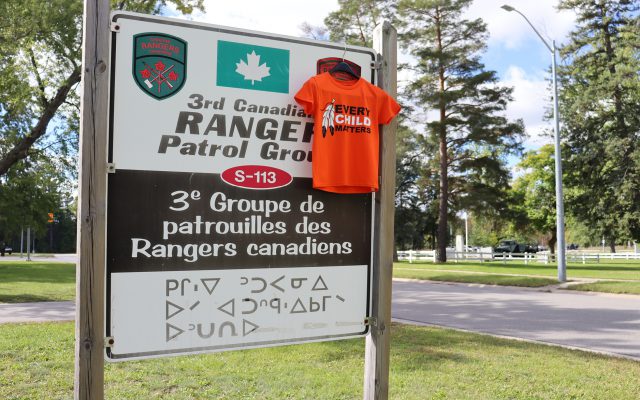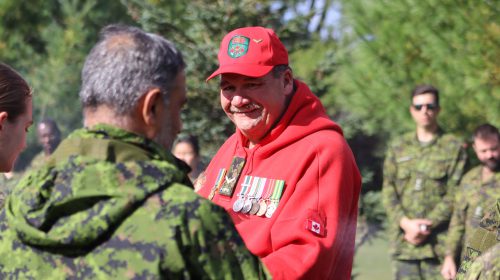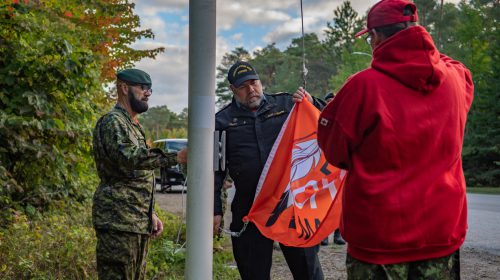
This message deals with topics that may cause trauma invoked by memories of past abuse. We recognize some individuals may not want to read further to minimize the risk of being triggered.

As the crowd disperses from the healing circle on the lawn of the 3rd Canadian Ranger Patrol Group (3 CRPG) building, the smile on Ranger Dave Walker’s face is contagious. It’s the morning of 29 September, the day before the second National Day for Truth and Reconciliation, and he has just finished an Indigenous teaching for a crowd of military members, leadership, and civilian personnel at Canadian Forces Base (CFB) Borden. There are even a few family members and small children in attendance.
“It’s fantastic,” says Rgr Walker, a reservist with 3 CRPG who also led a smudge ceremony that morning. “And the support we’re getting for people to be able to come out and give us their time shows how many barricades that were up before where people wouldn’t leave work, and now they’re here.”
Participants were able to lay tobacco down on the sacred fire and send up a prayer.
Now a federal statutory holiday, activities commemorating the day took place on the base the day prior for maximum participation. But Rgr Walker was at Base Borden on 30 September as well, offering smudging, teachings, and sacred fire for anyone who wanted to come, learn, or pray.
This year, Rgr Walker says the focus at his lodge is on family, and enjoying your kids.
“The grieving and the mourning, it goes hand in hand. But we have to have a balance, too.”
Rgr Walker is looking forward to more events to continue with the momentum of the past year, including recognizing Red Dress Day with a local campaign, and getting back to hosting regular sweat lodges once health restrictions permit. As the largest training base in Canada, he feels the awareness he’s seen grow at Borden is crucial not only for local CAF members, but for the entire CAF community.
“When I was here, there was nothing,” said Rgr Walker, who began his career with the military in 1979 as a radio operator. “And we didn’t talk about it. But there was still a lot of tragedy going on in our communities.”
It’s a big difference from what he’s seeing today. Among leadership, he believes that awareness will translate to being able to recognize there might be more to behaviour changes than just a bad day. They can then check in to see if they need support, and “they can maybe have a little more in depth, kind conversation with them and find out if some trauma has happened where they’re from, or in their family.”
“This will only help everyone in the forces, everyone on the base. And I really believe that.”
There is still plenty of work to be done and healing that needs to happen. With the establishment of the Truth and Reconciliation Commission of Canada, Rgr Walker feels there is a clear path forward. Funding will be required to achieve that path, and more awareness through the mainstream press to address ongoing issues, such as the disproportionate amount of Indigenous children in the foster care system. According to the 2016 Census, 7.7 per cent of all children under 14 in Canada are Indigenous, yet Indigenous children under the age of 14 account for 52.2 per cent of all children in foster care.
“What I’m hoping in the future is that we get everything going that we need, and less kids in foster care, and healthier families.”
National Day for Truth and Reconciliation is over. But there are actions that all of us can, and must, continue to take.
“By coming together on this day, we here in Borden take a step on the important journey known as reconciliation,” said Colonel Jonathan Michaud, Commander CFB Borden, MPGTG in his remarks at the ceremony. “It is a long journey. It necessitates self-reflection on the part of all members, and it does not end with the events of today. It is something that we must all continually build upon as we go into the future.”

“Just be great allies,” is the advice of Rgr Walker. “And any Mohawk or Anishinaabe, contact the Friendship Centres and get your kids involved.”
Those interested in learning more can contact the Barrie Native Friendship Centre or visit the National Centre for Truth and Reconciliation website for resources.
By: Emily Nakeff, Editor
If you need help: National Residential School Crisis Line 1-866-925-4419.
The National Indian Residential School Crisis Line has been set up to provide support for former residential school students. You can access emotional and crisis referral services by calling the 24-hour National Crisis hotline.





